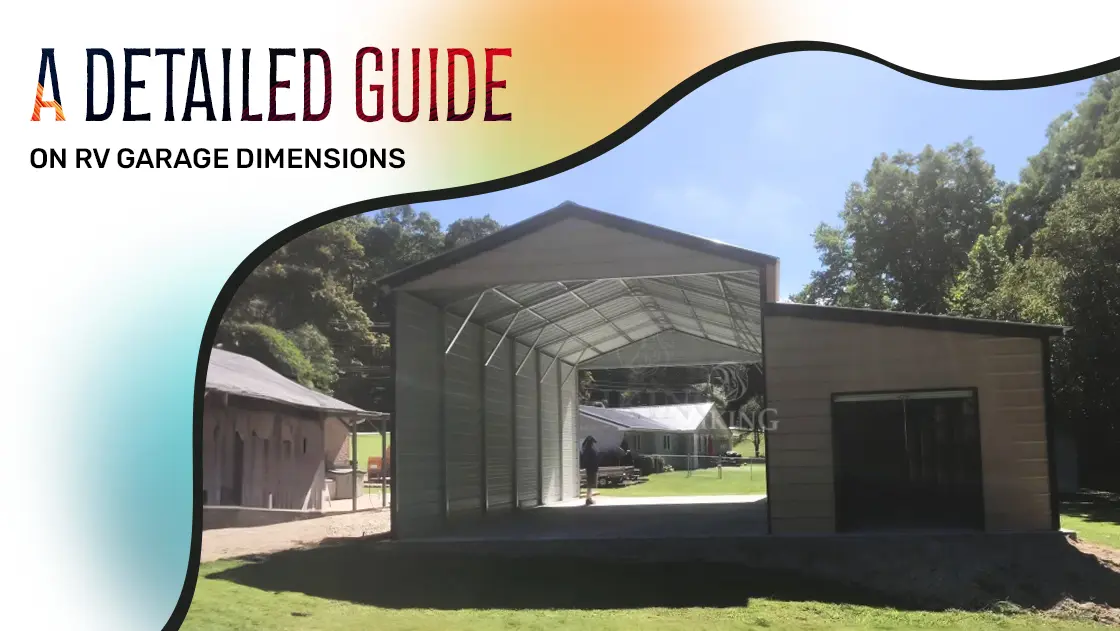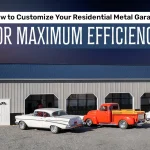A Detailed Guide On RV Garage Dimensions
September 30, 2024
Have you finally decided to build that dream RV garage? And why not, after all safeguarding your RV is the utmost priority to ensure its longevity and smooth functioning. But before you rush to buy shelter for your beloved motorhome, it is essential to plan it well. This includes selecting the right RV garage dimensions, extra storage space, ventilation, and insulation.
It is vital to consider several factors, from height and width to length and layout. These factors will help you build a garage that fits your RV and efficiently accommodates your storage and maintenance needs.
The Correct Way To Measure Your RV Garage Dimensions
Width
Take a measuring tape and calculate the width of your motorhome from one edge of the side mirror to another. This will give you total width. The RV garage width ranges between 8 ft. to 9 ft.Now, add at least 3 ft. to each side for opening and closing RV’s doors. This will ensure when you enter or leave RV, the doors don’t bump into the wall.
Length
Start from the front end of the bumper to the rear end, including any accessories. If you have an expandable RV, don’t forget to add that extra length. Now, add at least 4 to 5 ft. to the front and back for the easy maneuvering of the vehicle.
Height
Measuring height is straightforward. Take the measuring tape and calculate total vertical length from the bottom of the tires to the top. Include AC ducts, vents, and antennas on top. You don’t want to damage them while parking.
Extra Storage
If you need extra space for organizers and storage bins, add it to your RV garage size. The space can be used for installing industrial shelving, clear bins [labeled], or for workbenches.
In cases of towable RVs, it is important that you measure the overall length — with the tow vehicle and without. This will give you a holistic idea of the storage space you need.
The Correct RV Garage Dimensions To Look For
Garage sizes can differ depending on the length, width, and height of your RV and other customization needs. However, it is often said that bigger is always better when safely parking your RV and other essentials.
If you are working with a smaller space to incorporate the correct garage size, we suggest you build it as big as you can. This would be helpful in two ways. Firstly, when you upgrade to a bigger RV, you won’t have to worry about extending the garage.
Secondly, you can never have enough storage space; hence, building a garage that fits your RV and offers more is ideal. These garages can be completely personalized to meet your specific garage size and inventory needs.
What Is The Average Size Of An RV Garage?
The standard RV garage width for single vehicles ranges from 12 feet to 30 feet. It can also go further depending on the number of RVs and other factors. The height of the garage also differs according to the vehicle for smooth clearance of taller vehicles. They usually range from 12 to 16 feet. These also offer enough room for roof-mounted accessories over the RVs. As the sizes of RVs vary, the length of the garages can be between 20 feet and 60 feet.
However, the dimensions completely depend on your needs. They can be personalized to offer solutions to your specific problems. The cost of an RV garage will depend on customization and size.
RV Garage Sizes Based On Motorhome Class/ Types
There are different types of RVs, depending on their usage, sizing, and the luxury they offer. Each RV requires a different type of garage. Let’s get a detailed understanding.
1. Class A Motorhomes
Class A Motorhomes are the biggest and most luxurious RVs. They offer ample space and high-end features, making them ideal for long travels and even full-time living. They are built with advanced driving features and expansive spaces accommodating appliances for ease of operation, but due to their size and weight, they can be challenging to drive.
- length of Class A Motorhomes ranges between 25 and 45 feet
- width is between 8 and 10 feet
- height is between 11 and 13 feet
Hence, ideally, the right garage for these would be at least 14 feet high, 30 to 50 feet long, and 12 to 16 feet wide. These dimensions may change based on the accessories attached to your vehicle. The standard RV garage dimensions are 18ft. wide x 40 ft. deep x 14 ft. tall and cost $13,000 onwards.
2. Class B Motorhomes Or Camper Vans
These compact and versatile RVs are easy to drive and suitable for both urban and rural travel. Class B Motorhomes utilize space efficiently, with small common and personal areas and basic amenities. They are also more fuel-efficient than larger RV vans.
The size of Class B Motorhomes or camper vans ranges from:
- 17 to 23 feet in length
- 6 to 7 feet in width
- 8 to 10 feet in height
These RV vans require a garage offering a clearance of at least 12 feet in height, about 10 feet in width, and between 25 and 30 feet in length. A margin of about 5 feet is fair to consider in the case of additional attachments.
3. Class C Motorhomes
These mid-sized RVs can be easily identified by their over-cab sleeping areas. They offer the right balance between drivability and space.
Class C Motorhomes are typically:
- 20 to 33 feet long
- ~8 feet wide
- 10 to 12 feet high
They are easier to handle than Class A and offer a more conventional driving experience.
For easy parking and safety of an RV, the right garage for Class C Motorhomes with no accessories should have at least 14 feet of height, 40 feet of length, and about 12 feet of width.
4. Travel Trailers
These are towable RVs that can easily be hitched to another vehicle. They are available in a wide range of sizes and configurations. Travel trailers can have different interiors, ranging from basic amenities in compact trailers to various comforts in full-sized trailers.
The size of travel trailers can be between:
- 12 and 35 feet in length
- 8 feet in width
- 9 and 11 feet in height
A 30 to 40 feet long, 12 to 14 feet wide, and 14 to 16 feet high garage should be ideal for travel trailers without their towable vehicles. When incorporating them in your metal garages, it is advisable to measure the towable vehicle separately.
5. Fifth-Wheel Trailers
Fifth-wheel trailers are large RVs that are also towable but usually connect to a truck bed using a specialized hitch. They usually have multiple levels and spacious amenities. Fifth-wheel trailers are more stable than travel trailers but require a heavy-duty truck with a specific hitch.
In terms of their size, Fifth-wheel trailers are:
- 20 to 40 feet long
- 8 to 12 feet wide
- 11 to 13 feet high
Considering the hitch and extensions of these RVs, the garage should be about 40 to 50 feet long, 14 to 16 feet wide, and at least 16 to 18 feet high.
Factors That Impact RV Storage Building Cost
- Size
- Material Quality
- Add-Ons
- Customization
- Location
- Building Codes
- Market Price of Steel
Generally, the RV storage building costs between $15 and $25 per sq. ft. We also have affordable insulations like single and double bubble and woven R17 to regulate indoor temperature, reduce condensation, and boost the lifespan of metal garage and RV.
Doors & Windows
It is easy to add wide and large metal doors to an RV parking shelter compared to traditional storage. We also offer a walk-in door to access your storage or workshop without opening up the entire garage every time you want to take an item. Your metal RV garage price will also depend on design complexity. So, keep the garage’s design as simple as you can.
Major Considerations When Investing In Metal RV Garages
Several considerations are to be made when investing in a garage, which will likely determine the metal RV garage price.
- Size: Not all RVs are alike, and not all can fit into similar garages. It is essential to know the size of your RV. If there are multiple vehicles, ensure additional doors are built in for ease. Moreover, take the height of the RV into consideration. For example, Class A RVs or fifth-wheel campers will likely require oversized doors.
- Storage: Will you require a bigger garage for enhanced storage? You can install a walk-in door and additional shelves and cabinets in that case. The cost of RV garage with workshop space starts at $17,800 onwards for 24 ft. wide x 41 ft. deep x 15 ft. leg height.
- Customizations: If you have any specific designs or customization requests, it is advisable to think them through and sort them out before settling on a garage. While these will affect the cost, they are more likely to make your lives easier and hassle-free.
- Permits: You should also look into local permits and regulations. It is vital to check local building codes for compliance. You would be required to take a blueprint of your garage and pay a permit fee to local authorities.
- Budget: Another essential aspect is determining the budget you have set aside for your garage and ensuring that it meets your personalization needs.
Viking Metal Garages: Helping You Build The Perfect RV Metal Garage
Whether you have a larger class A motorhome or want to include extra storage space for gears and spare parts, we offer custom RV metal garages in all sizes and budgets. And we also have roll-up and walk-in doors for easy access. To know what RV garage size is ideal for you, call us at (704)-741-1587 and talk to our metal building expert for a parking space you can comfortably roll in. Don’t forget, when it comes to RV parking dimensions, the bigger the better!

